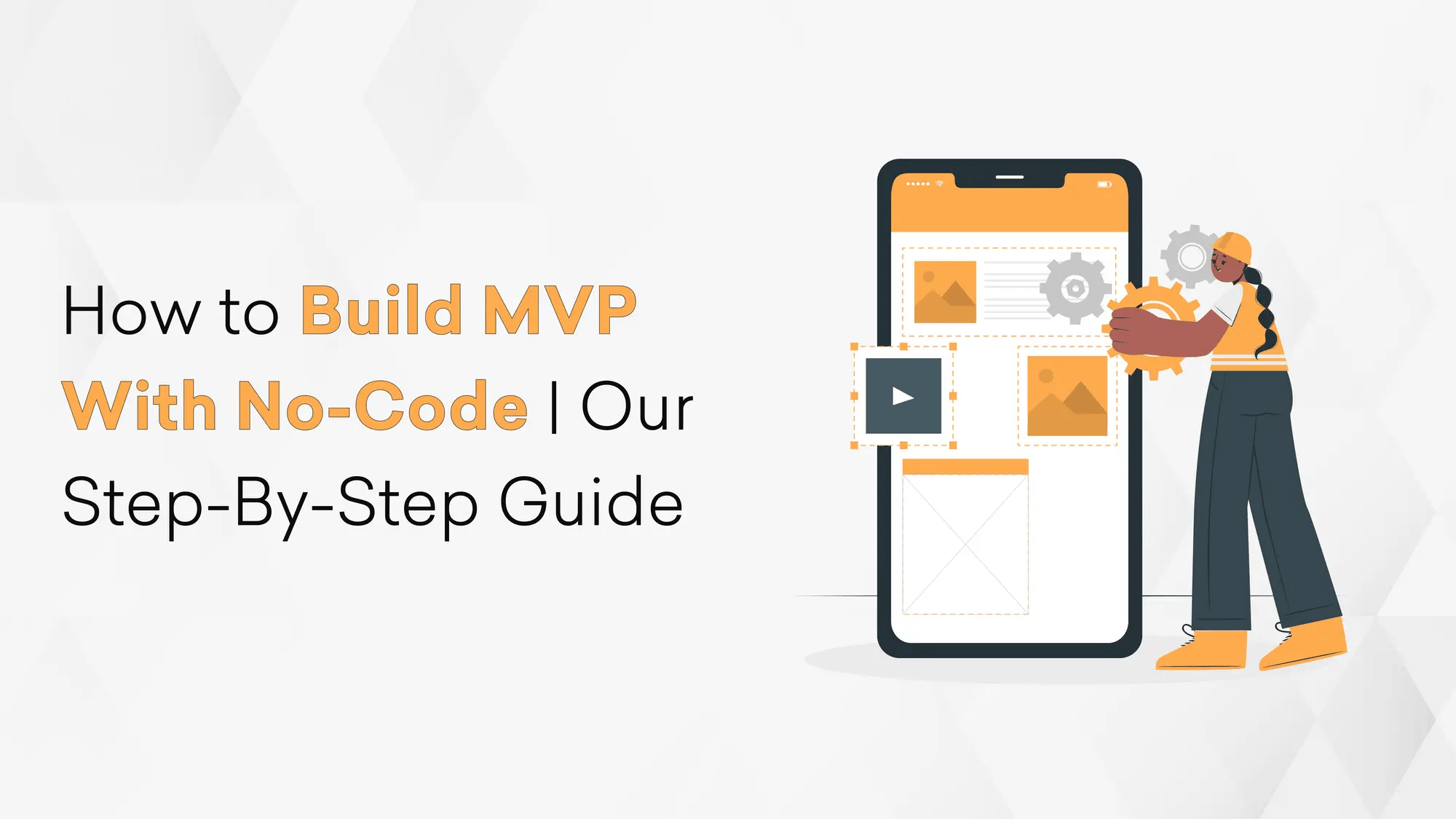
An MVP is a streamlined version of a product that solves a core issue. MVP solves help mitigate the risk of failure. Now, the trend to build No Code MVP is reshaping innovation.
Yes, it is now possible to build No Code mvp. In fact, by 2024, no-code will account for more than 65% of application development activity. No-code and low-code platforms' revenue is expected to rise to $187 billion by 2030.
Whether planning to build an MVP without code or exploring No Code MVP tools, these concepts offer a fresh approach to building No Code MVP, turning ideas into reality. Let's dig deep into the nitty-gritty.
The No-Code Advantage
No-code development is transforming the way we build products. Gone are the days of endless coding. Now, with drag-and-drop interfaces, anyone can create an MVP without coding.
The shift is fueling creativity across various industries, from healthcare to education. In developing regions, where access to technical education might be limited, No Code is democratizing technology, allowing local entrepreneurs to build their MVP and contribute to the global market.
The advantages of using No Code tools to build No Code MVP include:
- Speed: Development cycles are shortened, allowing for rapid prototyping and deployment. No-code solutions can bring about a 90% reduction in development time than traditional methods.
- Cost-Effectiveness: No-code platforms often reduce the need for specialized development skills, lowering labor costs.
- Accessibility: Democratizes the development process, opening doors for those without coding skills.
Identifying Your MVP Idea
MVP serves as a testing ground for developers and founders, allowing them to understand what needs improvement based on user feedback.
It's about killing unnecessary features and focusing on key ones.
There are different types of MVPs, such as Concierge MVP, Wizard of Oz MVP, Landing Page MVP, and Piecemeal MVP. Each type serves a specific purpose and can be chosen based on project objectives.
Whichever you pick, collaboration is key during this phase. Tools like Ideaflip or Miro can be incredibly valuable for collaborative idea generation. These platforms provide virtual spaces where teams can work together seamlessly, sharing thoughts, sketching concepts, and building on each other's ideas.
They allow for real-time interaction, making it easier to visualize the MVP idea and align it with the MVP scope and MVP features.
FAQ: How to build an MVP without code?
Building an MVP app without code is achievable through no-code platforms that offer drag-and-drop interfaces and pre-built templates. By selecting the right tools that align with your MVP idea and scope, you can build No Code MVP. This approach allows for rapid development and testing of your MVP without code.
Defining MVP Features and Scope
| Aspect | Description |
Core Features and Functionalities | Identify and prioritize essential features to build No Code MVP. Focus on what truly defines your product, and avoid unnecessary complexities. |
Lean Methodology | Apply lean principles when building No Code MVP. Focus on efficiency, cut waste, and deliver value through iterative development and continuous improvement. |
Agile Management | Use Agile management to build No Code MVP. Utilize tools like Airtable or Trello for real-time tracking, foster collaboration, and adapt to changes quickly to steer your MVP No Code to success. |
Wireframing and Design
Wireframing and design are pivotal to building No Code MVP and shaping the user experience (UX). Here's how you can approach it:
- Utilize Tools: Use No Code design tools like Figma or Canva to create wireframes and UI prototypes.
- Map User Journey: Identify key interactions and touchpoints.
- Iterative Testing: Allow for refinement and enhancement.
- Create an experience: Use consistent color schemes and clear typography
- Plan ahead of time: Designing MVP, keeping communication, clarity, and connection in mind.
Partner with Us for Success
Experience seamless collaboration and exceptional results.
These practices make sure that when you build an MVP without code, you focus on a user-friendly experience. By leveraging these No Code advantages, you create an MVP that's not only functional but also engaging, turning your mvp idea into a successful product.
Selecting No Code Tools
According to Gartner, by 2023, citizen developers will be four times the number of traditional developers in many giant organizations. However, having the know-how of the best tools will make all the difference.
Here's an overview of popular No Code platforms to look for when planning to build No Code MVP:
- Bubble for Web App Development: If you want to build an MVP without code for web applications, Bubble is a top choice. It's perfect for various MVP features, offering a drag-and-drop interface that makes it easy to create MVP without coding.
- Adalo for Mobile App Development: For those looking to build No Code MVP for mobile apps, Adalo is the way to go. Its user-friendly tools align with the MVP scope you define, allowing you to create professional-looking apps without writing code.
- Zapier for Integrations: Integrations are often essential in an MVP, and Zapier provides No-code advantages in this area. It's one of the No Code MVP tools that connect different apps, automating workflows for a seamless experience.
Choosing the right tools to build No Code MVP depends on understanding your MVP requirements.
Ask yourself these two questions:
- What's your MVP idea?
- What functionalities do you need?
Moreover, experiment with free trials or freemium versions to see how they fit your needs. The right tools will make the process of building No Code MVP smoother.
Building Your MVP - Step-by-Step Guide
Stage 1: Setting Up the Environment:
When you're ready to build No Code MVP, the first step is to create accounts on the No Code platforms that suit your project's needs.
Research platforms like Bubble or Adalo, and choose the one that aligns with your MVP features. Then, connect the relevant integrations.
This might include linking to your database or third-party services that enhance functionality. It's like setting up your workspace, so everything is at your fingertips.
Stage 2: Creating the Database
Your database is the backbone of your MVP. Tools like Airtable or Google Sheets are excellent for this.
Start by defining the data fields that your project requires.
What information will you store?
Then, establish the relationships between these fields. Think of it like organizing a library – everything needs its place.
Stage 3: Designing the User Interface
Now comes the fun part: designing the UI. Use No Code design tools to develop the components.
Partner with Us for Success
Experience seamless collaboration and exceptional results.
Focus on creating and designing an intuitive interface that's attractive and functional. Think of your user's journey through the app and make it as smooth as possible. Your design should guide them, not confuse them.
Stage 4: Implementing Functionality
This is where your MVP development comes to life. Walkthrough the process of using No Code logic builders. You'll incorporate actions, triggers, and conditions to create the functionality. It's like putting together a puzzle – each piece has its place, and it all needs to fit together seamlessly.
Stage 5: Testing Your MVP
Never underestimate the importance of thorough testing. Tools like TestFlight or browser testing are essential for Quality Assurance (QA).
Test your MVP with real users, gather feedback, and make necessary adjustments. Your MVP, apart from just looking good, needs to work well too.
Gathering Feedback and Iterating
In a nutshell, user feedback is the lifeblood of any MVP, especially when you build No Code MVP. It is important to understand needs, preferences, and experiences.
Setting up continuous feedback loops involves surveys and forms. On top of that, it includes social media engagement, user forums, and direct interviews as well. These channels provide real-time insights, promoting an active relationship with users.
If you are planning to build MVP without code, it can cost you $50 to $500 and even more per month, depending on the platform and features. However, this is significantly less costly than traditional development, making it a favored option for many entrepreneurs.
Preparing for Launch
| Stage | Task |
Finalize MVP Features | Implement, test, and align core functionalities with MVP scope. |
Complete User Testing | Validate MVP with real users and address last-minute issues. |
Optimize Performance | Tests under various conditions for smooth user experience, optimize as needed. |
Secure Data & Compliance | Implement security measures for data protection and legal compliance. |
Coordinate Marketing | Align with marketing for the launch campaign, and prepare press releases and social media posts. |
Prepare Support Channels | Set up helpdesk, FAQs, and train support staff. |
Monitor Launch Metrics | Use tracking tools to monitor engagement and feedback during the launch. |
Community Engagement | Engage through forums and social media for pre-launch buzz. |
Review Launch Readiness | Final review with stakeholders and confirm checklist completion. |
Launch Announcement | Plan official announcements, and coordinate with media. |
Celebrate Success | Acknowledge team efforts, recognize contributions, and share success. |
Conclusion
The no-code market value is expected to reach $21.2 billion in 2023, a significant increase from its $3.8 billion value in 2017. This clearly shows leveraging No Code development opens doors to innovation and creativity
Whether you're an entrepreneur with a vision or a professional looking to streamline processes, the No Code approach is accessible and inspiring. With opportunities like F22 Labs' 1-hour free consultation, building No Code MVP has never been more attainable.
Join the movement, explore the possibilities, and make your mark in this exciting new frontier.



